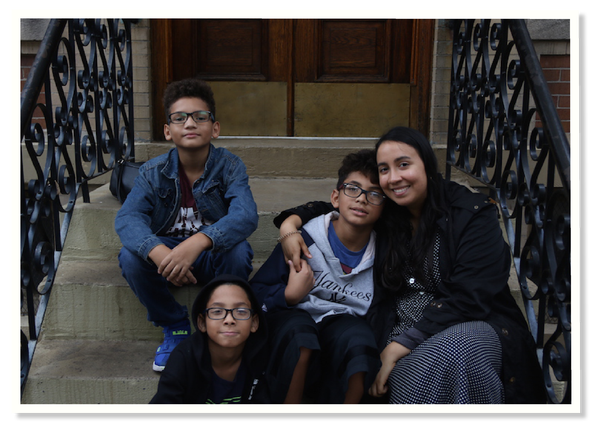I’VE NEVER GIVEN BIRTH – BUT I’VE DONE MY SHARE OF ‘PARENTING’
Angely Mercado

In communities like the one I grew up in, nannies are a rarity, but a ‘village’ of neighbors and relatives can be counted on to pitch in with child care.
At 27, I’ve never given birth and I’ve never been pregnant. But I like to joke that I have “children.” I didn’t intend to spend my preteen and teenage years helping to raise several of my neighbors’ children. But somehow, children always found me.
My first baby was J, whose mother moved into the apartment next to ours when I was in elementary school in Ridgewood, Queens. I helped her clean her apartment some Saturdays, and she’d help me bake brownies. We watched ’90s telenovelas together – it was J’s mother, and not my own, who explained the plotline of “La Usurpadora” to me.
When I was 11 she told my family that she was pregnant. My mom explained that the situation behind our neighbor’s pregnancy was complicated, and that she would need our support. So I looked at sonograms, helped her carry heavy bags, and painted the baby’s room. My siblings and I pitched in to organize and set up the baby shower. And right after J was born, I slept on my neighbor’s couch, getting up at 2 a.m. to help fix his bottle and feed him. I almost fell asleep at school that first week, but I liked helping out. J was tiny and warm and he smelled like milk, and I loved sitting in my neighbor’s living room, rocking him to sleep. I used to wonder what kind of job he’d want in the future, if he’d look like his mom, or if he’d be tall.
My neighbor fainted when she went into labor and broke her leg, so she was put on bed rest to help her recover. During this period, she struggled with severe mood swings. I didn’t know what postpartum depression was at the time; all I knew was that after someone had a baby, they became sad and tired and would sometimes wear the same house dress for over a week.
I couldn’t comfort my neighbor like her relatives or my mom could, and I certainly couldn’t understand why having a baby seemed to have made her so stressed out and unhappy. But I could help her care for her son. I was excited to finally meet J. I talked to him while I changed his diapers, I marveled at how tiny his toes were, and I practically cried when he started trying to gurgle responses to my questions.
I was there when J started learning how to walk and talk, and I was there when he started drawing recognizable pictures of things like airplanes and cars. I pushed J in his stroller while I followed his mom around grocery shopping, at doctors’ appointments, and on beach trips. My house name, Anga, was one of the first names J learned to pronounce. When he learned to read, J and I would help each other pick picture books. J liked anything to do with airplanes and animals so I always made sure to help him find those in the piles of books his mom had in her bedroom closet. I’d walk him to activities when his mom couldn’t and, as my parents often babysat J too, he was around pretty often.
But his early grade-school years were hard. J had trouble behaving, and I often had to mediate between him and his mother. I was still just a high schooler myself, but J and his mom had always felt like family. I wanted to do anything I could to make sure they would be O.K., even though I was really frustrated with his behavior, too.
“I don’t want to do laundry,” I remember him yelling at his mom. “I’m not going to the laundromat.”
I handed him his sneakers and walked with him to the laundromat. He complained and cried the whole time but I just kept handing him clothing to sort. Some days he’d refuse to get ready for school, or to leave the front steps of our building. My parents and I would help get J to school, convince him to do some chores, and talk to him about listening to his mom.
When I was in college, I’d drop J off at summer camp before heading to my summer class or summer job. On days when I was too busy to drop J off, a family friend whose daughters attended the same camp would take him. But his mom would tell me that he’d cry whenever I wasn’t there.
“The other girls are nice too, walking with them isn’t so bad,” I told him.
“Yeah, but I want to walk with you, not them,” he said.
J eventually started getting help for some of his behavioral issues, which made hanging out with him and his mom easier. As he transitioned into middle school, I didn’t have to watch him as often, but we’d go for walks sometimes and we’d hang out on my old block and talk about comic books and fan fiction.
I think of J as my “first baby,” but he wasn’t the only one. After I started high school, my nephews were born, and I graduated from one kid to a set of three. Whenever I felt overwhelmed, I’d remember what I did with J and it helped me through my auntie shifts with diaper explosions, middle-of-the-night bottles of milk, and the terrible twos. I’d take my nephews to the park, help watch them when my brother and sister-in-law ran errands, and I’d get them to finally go to sleep by telling bedtime story after bedtime story.
As I started meeting more people outside my community, I learned that affluent people didn’t always rely on neighbors and relatives and would hire nannies or babysitters. Most people from working-class communities don’t have nannies. But they have people like me.
Around that time, I learned that my mom had also helped care for her nieces and nephews, and the children of close friends, before having her own kids. My dad, who grew up as the middle child of 13 on a mountainside in Puerto Rico, practically raised his last two siblings. His older sister was taken out of school to help raise him. My maternal grandmother helped raise a lot of my mom’s younger cousins. She also helped raise me, and I helped take care of her for a while after she had a stroke when I was in high school. I’ve just carried on the tradition of “adopting” kids and and keeping them safe.
When I finally moved out of my parents’ home, I made sure to find an apartment in the same neighborhood so that I could still visit my nephews and still stop by to visit J and his mom. My nephews are in middle school now and tell me about their crushes and the teachers they like. They come over to my apartment and we sing Bad Bunny lyrics, make snacks, or go hang out on their front steps.
J is a teen now. He’s taller than me, really tan, and has a headful of beautiful curly hair. He likes video games and anime T-shirts.
“Were you my main babysitter?” he asked me a few months ago. “I remember seeing you around all the time.”
We were both sitting on my bed hanging out and catching up.
“I was always there,” I reminded him. I had missed seeing him around thanks to my crazy schedule when I was freelancing and working two jobs.
J watched the Fourth of July fireworks from our rooftop with me and my family this year. We talked about anime series that we both liked, and he told me about school and asked me about freelancing. We compared classic series and he nagged me about not finishing season three of “Attack on Titan.” We walked around after the fireworks and looked at stupid memes on his phone. It felt like hanging around a much younger brother again.
“How’s high school?” I asked him.
He rolled his eyes and then laughed.
“It’s not so bad actually.”
“At least it doesn’t suck as much as middle school,” I told him.
He asked to hang out again, and I told him I’d shoot him a text and that we’d go get lunch soon. We’ve messaged a few times, and if I go for too long without hearing from him, I reach out again or stop by to visit J and his mom. I’m proud that J is growing up and learning how to be comfortable with himself. And I like to think that hearing him out and doing my best to be patient helped him grow up to be the teenager he is today.
I’m still part of J’s village. And he’s part of mine.



